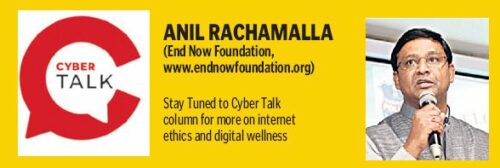Cyber Talk: Beware of various types of spoofing
It can be serious threat to security and privacy; it is important to take appropriate preventive measures

Hyderabad: Spoofing is the act of falsifying or disguising one’s identity or data to appear as someone else. It can refer to various types of deception in computer networking, including e-mail spoofing, IP spoofing, caller ID spoofing and website spoofing.
Spoofing can be a serious threat to security and privacy, and it’s important to be aware of these types of attacks and take appropriate preventive measures.
Also Read
Fraudsters dupe people into revealing sensitive information like their credit card numbers, OTPs, or login credentials by disguising themselves as trusted authorities. People get calls from lottery, bank, or any other institution asking for bank details and an OTP for depositing cash prices.
These calls are likely from scammers who trick targets into exposing bank information so they can steal money. They constantly put false information and pave the way to establish trust.
Email spoofing:
Email spoofing is when someone sends an email message with a forged “From” address, making it appear to come from someone else. This is commonly used in phishing attacks, where the attacker tries to trick the recipient into revealing sensitive information or downloading malicious software.
* The sender’s email address may look unusual and suspicious, such as including a misspelled name or extra characters that make it different from the legitimate sender’s address
* Spoofed emails often contain requests for personal information on credit card numbers or passwords
* Spoofed emails may contain an urgent request to take action like resetting a password or verifying account information
* Emails containing unusual attachments, such as .zip or .exe files, should be treated with caution as they may contain malware
* suspicious links in the email may lead to a fake website that looks legitimate or may have unusual characters or redirect to a different website.
IP spoofing:
IP spoofing involves falsifying the source IP address in a network packet to hide the identity of the sender or to launch an attack. This is often used in Distributed Denial of Service (DDoS) attacks, where a large number of machines send traffic to a target with a spoofed IP address, overwhelming the network and causing a denial of service.
* If you notice unusual network traffic on your network, such as a large number of packets being sent from a single IP address, it could be a sign of IP spoofing
* Spoofing can also cause authentication issues, such as users being locked out of their accounts or denied access to certain resources
* If your server crashes without any apparent reason, it could be due to an IP spoofing attack
* If you notice unusual entries in your server logs, such as logins from IP addresses that are not
associated with your network, it could be a sign of IP spoofing
* IP spoofing can also cause network performance issues such as slow data transfer rates, increased latency, or dropped connections
Caller ID spoofing:
Caller ID spoofing is when someone falsifies the phone number that appears on the recipient’s caller ID display. This is often used in phone-based phishing attacks, where the attacker poses as a legitimate caller to trick the recipient into revealing sensitive information or sending money.
* Caller ID spoofing involves using phone numbers that are out-of-area or unusual, such as numbers that are similar to your own or that come from another country
* If you receive a large number of calls in a short period of time or if you receive calls at unusual times, it could be caller ID spoofing
* If you receive unsolicited calls from unknown companies/individuals, it could be a sign of caller ID spoofing
* Caller ID spoofing often involves requests for personal information like credit card numbers
* If the call quality is poor or if there are unusual sounds or interruptions during the call, it could be a sign of caller ID spoofing
* If the caller hangs up as soon as you answer the phone, it could be a sign of caller ID spoofing
How to prevent and be safe from spoofing:
* Be cautious of unsolicited emails and sms, click on short links received (via emails/sms/messenger) only after you validated if it’s a phishing link or a good link
* The lock symbol in the browser address bar is missing. If you click on the address bar, the URL starts with http:// instead of https://
* Most of the spoofed sites don’t use usual auto-fill login credentials
* Improper spelling, alphabet, colour scheme, or design
* Enable Two- factor authentication 2FA for email and social media sites
* Use complex and strong passwords which are hard to crack
* Pause and check the website URL’s before you enter any credentials (i.e., instead of www.amazon.com it can have www.amazonn.com or www.arnazon.com)

- Tags
- Cyber Talk
- data
- spoofing
Related News
-
Watch: Nani’s fierce new avatar unveiled in ‘The Paradise’ song ‘Aaya Sher’
33 seconds ago -
Intelligence agencies assess renewed efforts to destabilise Punjab through tactical escalation
1 min ago -
China restricts exports to 40 Japanese entities with ties to military
10 mins ago -
Autorickshaw overturns near Mallapur in Jagtial, students injured
11 mins ago -
Madhuri Dixit experiences the world’s busiest street – Shibuya Crossing in Japan
27 mins ago -
KTR condemns felling of 200 trees in Mahabubnagar, demands action
37 mins ago -
264 caught for harassing women at Hyderabad’s Numaish
45 mins ago -
SC takes cognisance of NCERT class 8 chapter on corruption in judiciary
45 mins ago




